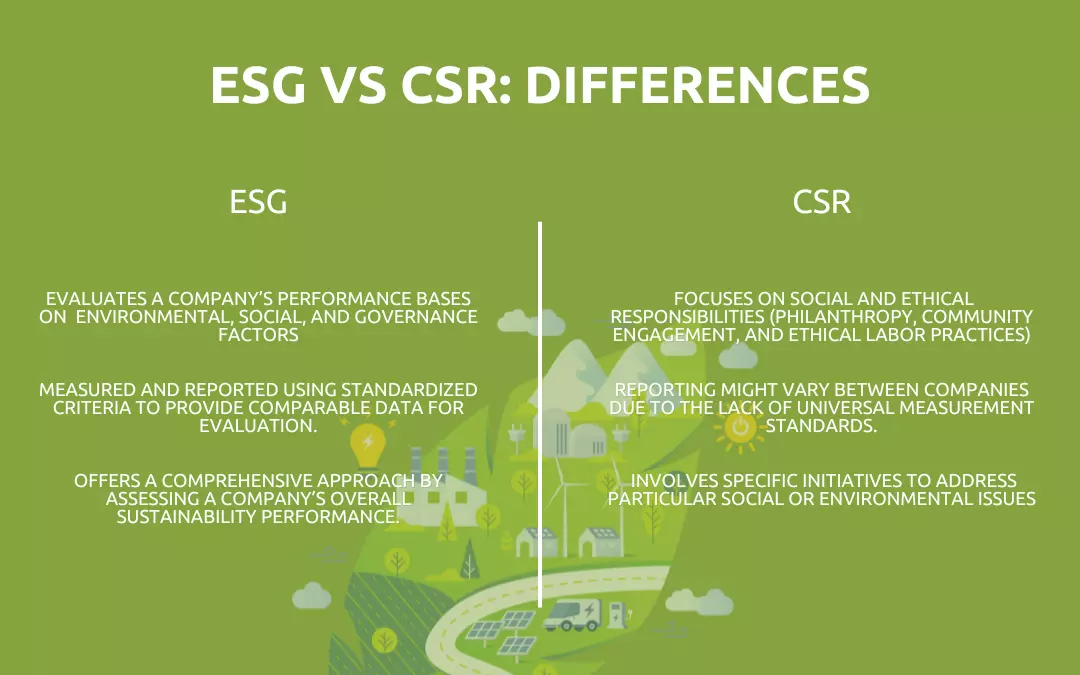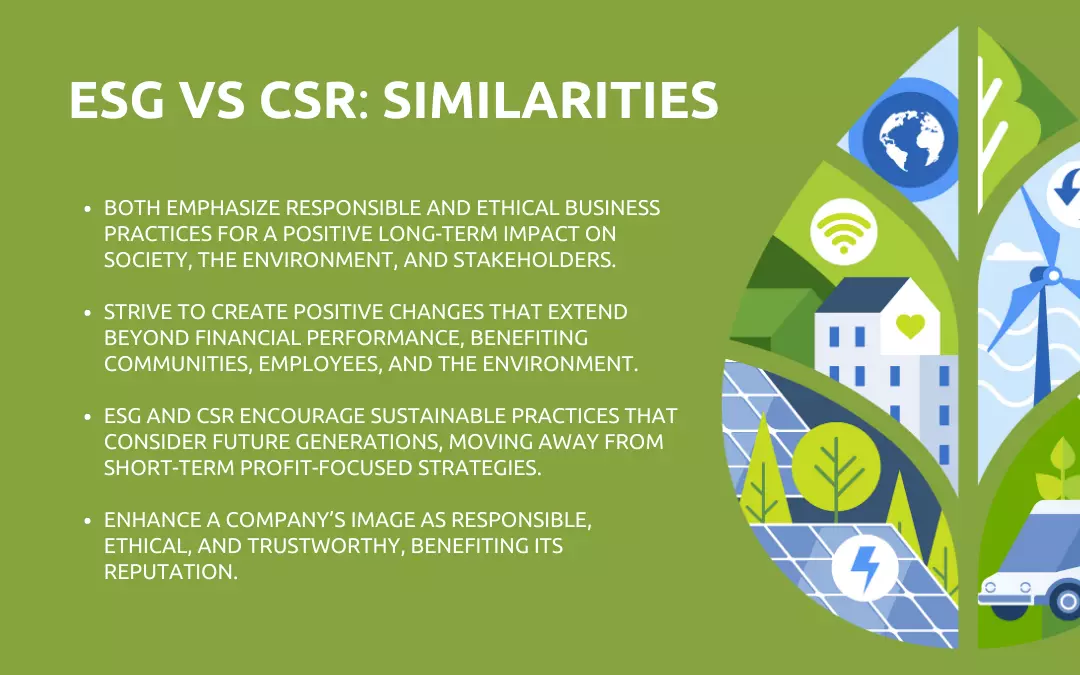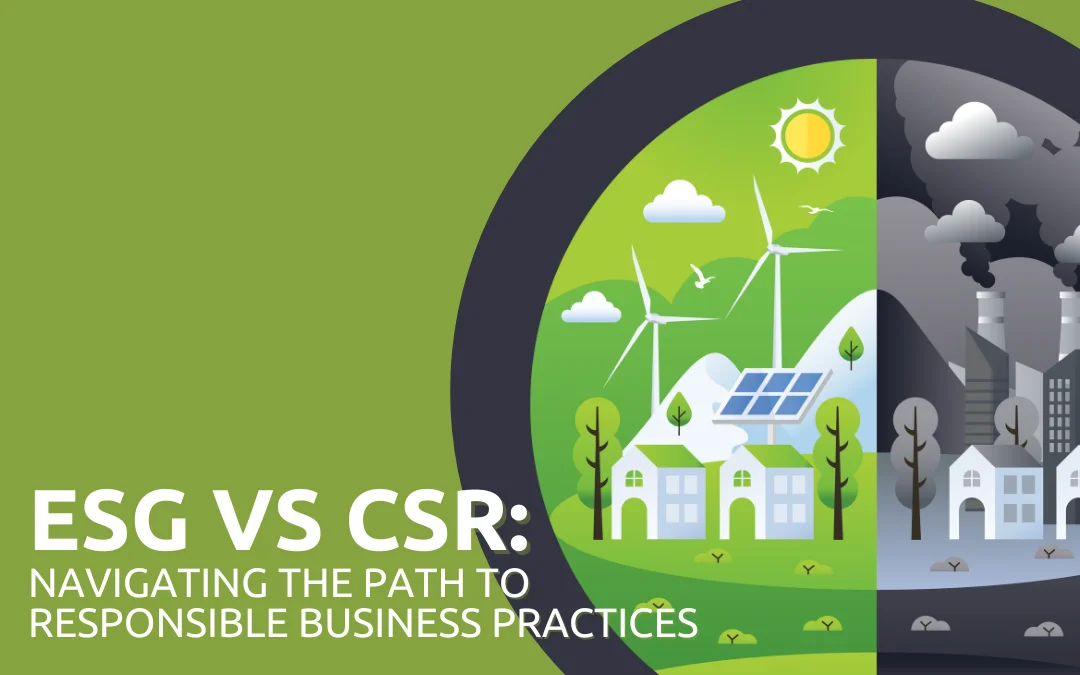ESG vs. CSR: The Differences
Corporate responsibility and ethical business practices are essential. Two approaches in this context are ESG (Environmental, Social, and Governance) and CSR (Corporate Social Responsibility). Let’s take a closer look at the key differences between ESG and CSR.
Focus:
ESG: Includes environmental, social, and governance factors and evaluates a company’s performance and impact in these areas.
CSR: Focuses primarily on social and ethical responsibility, including philanthropy, community engagement, and ethical labor practices.
Scope:
ESG: Provides a comprehensive approach by evaluating a company’s overall sustainability performance.
CSR: Typically includes specific initiatives to address specific social or environmental issues.
Integration into Corporate Strategy:
ESG: Is integrated into a company’s business strategy and decision-making processes as a strategic approach to value creation.
CSR: Often treated separately from the core business and focuses on giving back to the community.
Stakeholder Engagement:
ESG: Involves a broad range of stakeholders and responds to demands for transparency and accountability.
CSR: Focuses on community engagement and philanthropic activities.
Measurement and Reporting:
ESG: Measurement and reporting using standardized criteria to provide comparable data for evaluation.
CSR: Reporting may vary from company to company as there are no measurement standards.
Long-Term vs. Short-Term Orientation:
ESG: Seen as a long-term approach focused on sustainable development goals.
CSR:May include short-term projects that target specific social or environmental challenges.

The ESG Advantage:
ESG is more than just CSR; it is a holistic framework that evaluates a company’s overall sustainability performance. By incorporating environmental, social and governance factors into core strategy, ESG aims to create long-term value and resilience.
The Role of CSR Programs in ESG:
CSR programs play an important role within the ESG framework. They contribute to social and community engagement within ESG and enhance a company’s reputation and relationships with its stakeholders.
The Evolution: CSR to ESG:
The transition from CSR to ESG reflects the broader scope of responsibility. CSR originally focused on specific initiatives, while ESG integrates these initiatives into the company’s overall strategy.
Distinguishing CSR and ESG:
ESG encompasses CSR initiatives but goes beyond them by considering governance and financial performance in the context of sustainability.
Similarities Between ESG and CSR
Focus on Sustainability:
Both ESG and CSR focus on responsible and ethical business practices that have a positive long-term impact on society, the environment, and stakeholders.
Positive Impact:
ESG and CSR are focused on creating positive change that goes beyond financial performance to benefit communities, employees, and the environment.
Stakeholder Engagement:
Both approaches emphasize stakeholder engagement, such as employees, customers, investors, and communities, and promote transparency and strong relationships.
Long-Term Perspective:
ESG and CSR promote sustainable practices that engage future generations and move away from short-term, profit-driven strategies.
Ethical Business Practices:
Both emphasize ethical behavior, human rights, and fair labor practices, and advocate for business integrity.
Environmental Responsibility:
ESG and CSR recognize the importance of environmental responsibility and promote resource conservation and sustainable practices.
Community Engagement:
Both frameworks emphasize community engagement, whether through philanthropy or development initiatives.
Reputation and Brand Building:
ESG and CSR enhance a company’s image as responsible, ethical, and trustworthy….
Alignment with Global Goals:
ESG and CSR align with global sustainability goals and contribute to a more just and sustainable world.
Integration into Business Strategy:
Both advocate integrating ethical and sustainable practices into a company’s core strategy.
Collaboration and Partnership:
Both require collaboration with stakeholders and recognize collective efforts to make meaningful change.

